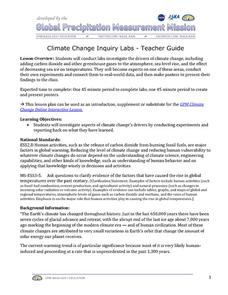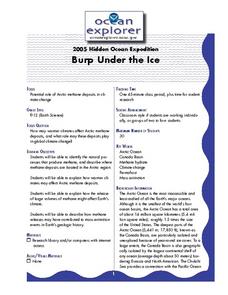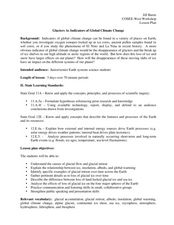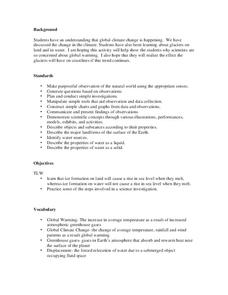Curated OER
Ice Core Research
Learners study the work of Dr. Hajo Eicken through an audio conference. They engage in a conference call with Dr. Eicken to identify how ice core research is designed and conducted. After asking Dr. Eicken questions, they record their...
NOAA
Deep-Sea Ecosystems – Entering the Twilight Zone
Imagine an ecosystem without any light or oxygen, where living things convert carbon dioxide into food. This ecosystem is thriving and might just be the largest ecosystem on our planet, yet we know very little about it. The lesson...
NASA
Climate Change Inquiry Lab
With global temperatures on the rise faster than ever recorded, the effects of a heating planet could be devastating. Allow learners to discover just what the world is in store for if the warming continues through a series of videos, a...
Curated OER
You're as Cold as Ice!
Students study the movement of glaciers and how they have affected the Earth. In this geology lesson students simulate the effects glaciers have on landscape and watch video segments.
Curated OER
Light Stick Chemistry
In groups of three with the lights off and the shades drawn, investigators place inactivated light sticks, in three beakers: one filled with ice water, another with lukewarm water, and the other with room temperature water. They wait...
American Museum of Natural History
Climate Change
It actually is possible to have too much of a good thing when it comes to climate change. A slide show lesson describes how burning fossil fuels contributes to climate change. Individuals read about the scientific process and the...
Carnegie Mellon University
Introduction to Climate
Begin a full activity on climate change by demonstrating how carbon dioxide gas contributes to increased temperatures. Be aware that pressure inside the antacid-containing bottle in Activity 2 may cause the lid to fly off; keep viewers...
Curated OER
Life is Weird
Students study the organisms that are found in cold seeps and see how they interact with each-other. In this biological organism lesson students describe the major features of cold seeps and the process of chemosynthesis.
Curated OER
Monsters of the Deep
Students describe major features of cold seep communities and list the organisms that are typical in these communities. In this deep sea environment lesson students work in groups and research their given cold seep group.
Curated OER
The Energy Debate - Sea Level Rise
Students comprehend the impact of global warming on our coastal cities. They appreciate how geographic information systems can be used to represent scientific data. Students research the melting of the ice caps in Antarctica and the Arctic.
Curated OER
Burp Under the Ice
Students examine the impact of climate warming on Arctic methane deposits. They identify natural methane processes and describe how this contributes to species extinction. They write reports on their findings.
Curated OER
Whale Is Stuck
Students engage in the process of problem solving with the help of children's literature story of how the whale was trapped and then freed. The story illustrates the power of teamwork and commitment. The students practice the skill of...
Curated OER
Chemosynthesis for the Classroom
Explorers set up Windogradsky columns with local mud so that they can culture microorganisms. After three and six weeks they make observations of the mud and the organisms growing in it. For this way they observe succession and relate...
Curated OER
Entering The Twilight Zone
In this lesson sixth grade students get into groups and research a given ocean habitat. The major features of cold-seep communities are the objective but plenty information is given about other habitats which could be assigned to...
Curated OER
Glaciers As Indicators of Global Climate Change
Students research about glacial ice melting on the four major spheres of the Earth. In this earth science instructional activity, students explain how this process relates to global warming. They create a presentation and share their...
Curated OER
Condensation
Students participate in the scientific process to investigate what happens to water when it evaporates by observing condensation. In small groups they observe what happens to ice in a cup, and what occurs when they hold a bowl of ice...
Curated OER
Entering the Twilight Zone
Students describe major features of cold-seep communities and the process of chemosynthesis as it relates to organisms in each habitat. In this deep-sea habitats lesson, students study the categorization of ocean habitats according to...
Curated OER
A Piece of Cake
Learners examine life under the sea to discover coral gardens and microhabitats. They demonstrate learning by creating an edible marine ecosystem with a sheet cake, icing, and different candies.
Curated OER
Climate And the Greenhouse Effect
Students demonstrate the greenhouse effect. They recognize that relatively small changes to our environment can stimulate significant climate changes. They determine that the "scientific method" is a process of testing hypotheses and...
Curated OER
This Old Tubeworm
Students plot data to construct and interpret a graph about vestimentiferans at cold-seep sites in the Gulf of Mexico. In this deep sea lesson, students plot data provided for the growth of tubeworms. They use the graphs to determine...
Curated OER
High Up in the Himalayas
Have your class supplement their knowledge on the Himalaya mountain range. In a brief handout, they read about the land masses that collided to form the Himalayas and other mountain ranges. It also touches briefly on the Earth's crust...
Curated OER
Global Climate Change
Second graders investigate the effect of melting glaciers to sea level. In this earth science lesson, 2nd graders simulate the process in the lab by conducting an experiment using ice cubes and clay. They explain the consequences of...
Curated OER
A Tool for the Environment
In this desalting salt water worksheet, students will read about three different methods of desalting sea water which includes distilling, crystallizing, and filtering. Students will describe these methods in three short answer questions...
Curated OER
Life is Weird
Learners describe features of cold seep communities and list organisms that can be found in these communities. In this exploratory lesson students complete an activity and describe the process of chemosynthesis.

























